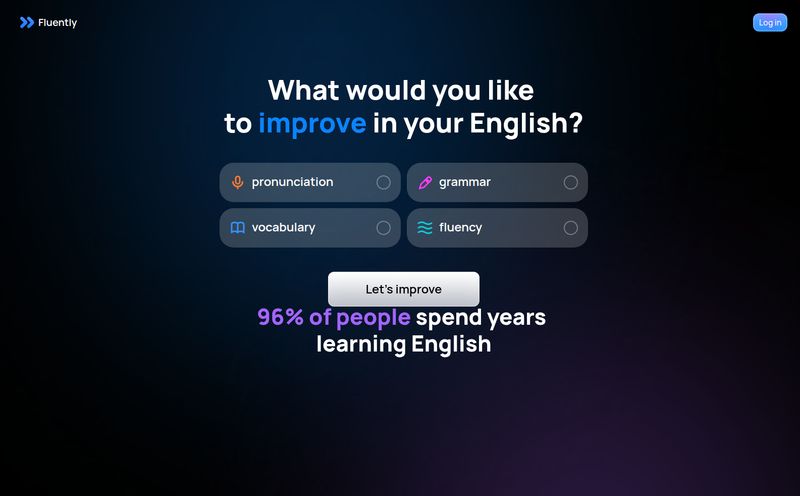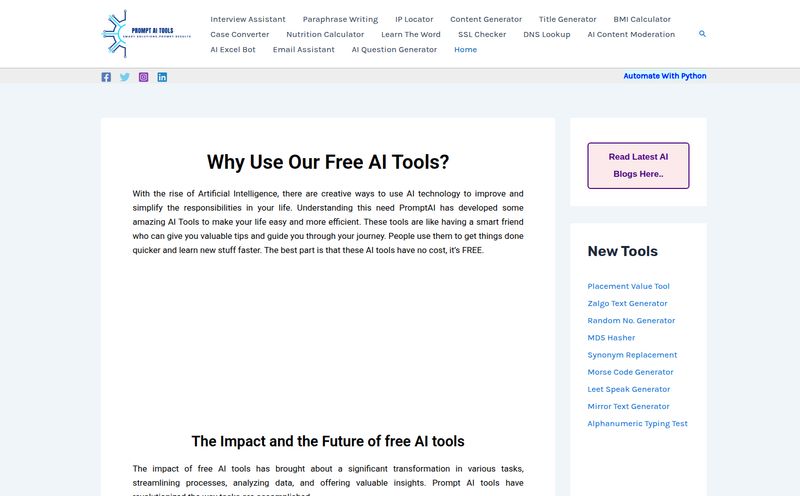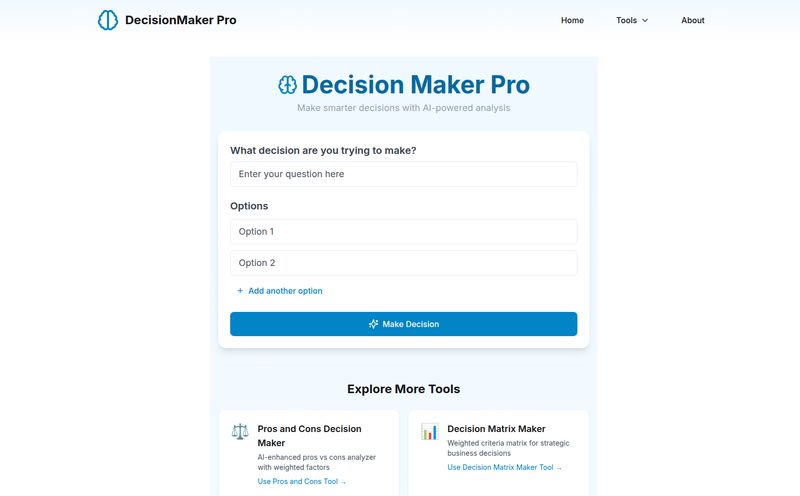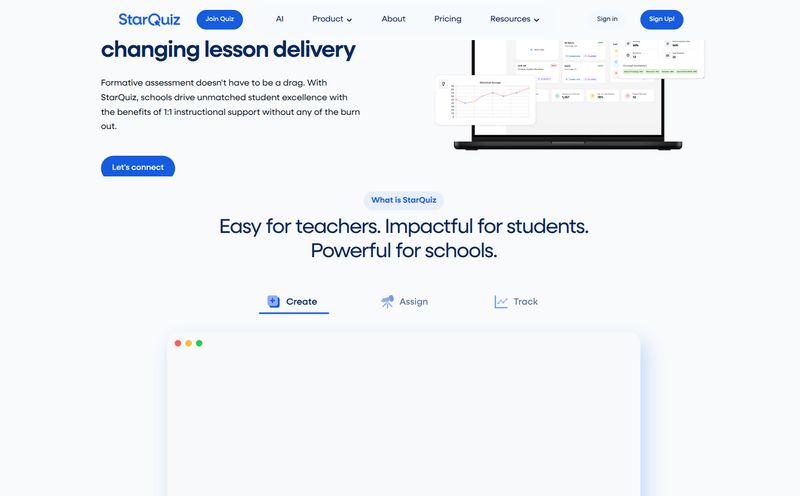We’ve all been there. It’s 3 PM, you’re on your third coffee, and you’re staring down the barrel of a spreadsheet that needs cross-referencing with your CRM. It’s the kind of mind-numbing, soul-crushing admin work that makes you question your life choices. It's death by a thousand clicks.
For years, the solution has been automation platforms. Tools like Zapier or Make have been my trusty sidekicks, the digital duct tape holding my workflows together. They’re powerful, no doubt. But they can also be… fiddly. You have to map every field, set up every trigger, and pray you didn't miss a step. It's engineering, really.
So, when I first heard about Assista, I was skeptical. Another AI tool promising to revolutionize my workday? Sure. But their tagline—"Type. Enter. Done."—was just cheeky enough to grab my attention. It suggests a different kind of relationship with automation. Less engineering, more delegating. And I have to say, after spending some real time with it, they might actually be onto something.
What Exactly is Assista? (And Why Should You Care?)
Here’s the thing: Assista isn’t just another “if this, then that” connector. I think the best way to describe it is like this: Zapier gives you the pipes and the plumbing to connect two rooms. Assista gives you a smart, eager apprentice who you can just tell what to do.
Instead of manually building a complex, multi-step workflow, you just type a command in plain English. Stuff like:
"Hey Assista, find all new leads in HubSpot from the last 24 hours and draft a personalized follow-up email for each one."
Think about that for a second. That's not a simple trigger-action. That requires searching, filtering, understanding context, and creating something new. It’s an AI agent that goes and does the work for you across its integrated apps, which include heavy hitters like Gmail, Slack, Notion, and HubSpot. No APIs. No coding. Just talking to it like you would a team member.
This is a fundamental shift. We're moving from connecting apps to commanding them. And frankly, it’s about time.
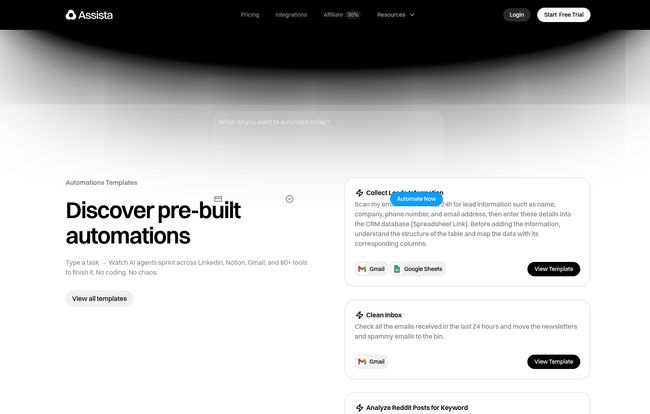
Visit Assista AI
Putting Assista to the Test: Some Real-World Scenarios
Of course, marketing copy is one thing. Performance is another. I decided to throw a few of my own daily grinds at it to see if it would buckle.
First up, my content marketing chaos. I have a messy Notion board where I dump ideas. My usual process involves manually creating summaries, writing social media blurbs, and then scheduling them. With Assista, I tried: "Take my latest approved article in Notion, write three engaging tweets about it, and schedule them for Monday, Wednesday, and Friday." It took a minute, but it actually worked. The tweets were surprisingly decent—not perfect, but a solid 80% of the way there, saving me a good 20 minutes of creative drain.
Next, I tackled project management. We live in Slack, and important decisions can get buried fast. I tasked Assista to: "Summarize the #project-phoenix channel from yesterday and create a to-do list in Asana based on the action items mentioned." This felt like pure magic. It pulled out the key points and created tasks assigned to the right people. A task that would have taken me 30 minutes of scrolling and Ctl+C/Ctl+V was done before my coffee got cold.
The Good, The Bad, and The... AI-ish
No tool is perfect, right? After the initial "wow" factor wore off, I started to see the full picture. Here’s my no-fluff breakdown.
Where Assista Really Shines
The sheer simplicity is its superpower. The "no-code" movement has been great, but Assista feels like the next step: "no-thought" automation. You don't need to think like a developer to build a workflow; you just need to know what you want done. The platform claims it can save users up to 4.7 hours daily. While that feels a bit optimistic for most, I can easily see it clawing back a solid hour or two of high-friction tasks every single day. That's huge. Plus, their free plan is actually useable. It gives you enough tokens to run real tests and see if it fits your workflow before you have to pull out a credit card, which I always appreciate.
A Few Caveats and Watch-Outs
Okay, let's ground ourselves. The biggest thing to be aware of is that its app library, while growing, isn't the sprawling universe you'll find on Zapier. It has the big names, but if you rely on a niche SaaS tool for your work, it might not be there yet. It's a classic quality over quantity play. Second, the token-based pricing requires a bit of a mental adjustment. It’s like those old-school mobile data plans—you need to keep an eye on your usage. It's not a flat-rate, all-you-can-eat buffet. Lastly, it’s still AI. The ghost in the machine can sometimes misunderstand a nuanced request or make a small error. I'd recommend double-checking its work for the first few runs on any critical task until you learn how to phrase your commands perfectly.
A Look at Assista's Pricing Structure
So how much does this digital assistant cost? The pricing is based on a token system, which is essentially the 'fuel' your AI agents use to perform tasks. The more complex the task, the more tokens it uses.
Here’s a simplified breakdown of their main plans (they also offer yearly discounts):
| Plan | Price (Monthly) | What You Get |
|---|---|---|
| Free Plan | $0 | 1M Tokens to start |
| Pro 20 | $20 / month | 20M Tokens (approx. 400 tasks) |
| Pro 50 | $45 / month | 50M Tokens (approx. 1000 tasks) |
| Pro 100 | $80 / month | 100M Tokens (approx. 2000 tasks) |
They also have an Enterprise plan for larger teams with custom needs. The key is to start with the free plan, see how many tokens your typical tasks consume, and then pick a plan that fits.
Is Assista a Zapier Killer? Or Something Else Entirely?
This is the big question for anyone in the SEO and digital marketing space. My take? No, it’s not a Zapier killer. Not yet, anyway. I think it’s a whole new category of tool.
Zapier is your heavyweight champion for deterministic, systemic automation. "When a form is submitted on my website, create a lead in Salesforce, add a row to Google Sheets, and send a notification to Slack." It's a reliable, unthinking assembly line.
Assista is different. It’s for cognitive automation. It excels at tasks that require a bit of interpretation, summarization, or creation. It's less of an assembly line and more of a personal assistant who can handle a list of varied chores.
In my world, I see them living side-by-side. I'll still use Zapier for my core, rigid data pipelines. But for all the ad-hoc, time-consuming daily tasks that require a bit of brainpower? I'm absolutely handing those over to Assista. It’s a tool for reclaiming your focus and creative energy.
Frequently Asked Questions about Assista
- How is Assista different from ChatGPT?
- ChatGPT is a conversational AI that provides information. Assista is an action-oriented AI that is directly integrated into your business apps. It doesn't just tell you how to do something; it goes and does it for you.
- Do I need any technical skills to use Assista?
- Absolutely not. That's the whole point. If you can write an email or a text message, you can use Assista. No coding, no APIs, no complex setup.
- Can I try Assista for free?
- Yes! There's a free plan that gives you 1 million tokens to test out its capabilities and see how it fits into your workflow before committing to a paid plan.
- How many apps does Assista integrate with?
- Currently, it integrates with over 35 popular applications, including the Google Suite, Slack, Notion, HubSpot, Asana, and more. The list is constantly growing.
- Is my data secure when using Assista?
- Assista takes security seriously, employing security measures to protect your data. As with any third-party tool, it's always good practice to review their privacy policy and be mindful of the permissions you grant.
- What the heck is a 'token'?
- Think of tokens as the currency Assista uses to perform tasks. Simple actions might use a few thousand tokens, while more complex workflows that involve multiple steps and data analysis will use more. The pricing plans give you a monthly allowance of these tokens.
Final Thoughts: Is It Time to Hire an AI Assistant?
Look, the hype around AI can be exhausting. But every once in a while, a tool comes along that feels less like a gimmick and more like a genuine glimpse into the future of how we'll work. For me, Assista is one of those tools.
It’s not perfect, and it won't replace every tool in your stack. But its focus on natural language and delegating cognitive tasks is a powerful new direction for productivity software. It's the first time an automation tool has felt less like a machine I have to program and more like a team member I can collaborate with.
If you’re tired of the daily grind of digital admin and want to reclaim some of your time and mental energy, I’d say giving Assista's free plan a spin is a no-brainer. You might just find you have a new favorite coworker.
